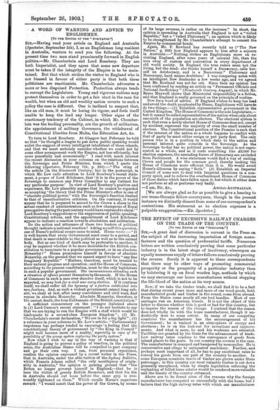THE EFFECT OF EXCESSIVE RAILWAY CHARGES ON THE TRADE OF
THE COUNTRY.
[To THE EDITOR OP THE "SPECTATOR.') Sin,—.A great deal of discussion is current in the Press on the subject of the increasing importation of foreign manu- factures and the question of preferential tariffs. Numerous letters are written conclusively proving that some particular industry is in the latest stage of insolvency, whereupon an equally numerous supply of letters follows conclusively proving the reverse. Surely it is apparent to these correspondents that there may be other ways of promoting commercial prosperity or the prosperity of a particular industry than by bolstering it up on fiscal wooden legs, methods by which we may encourage our home manufactures without stopping the life-blood of the nation at its very source.
Now, if we take the timber trade, we shall find it to be a fact that during recent years more and more of our wood goods, both manufactured goods and timber in the round, come from abroad, From the States come nearly all our tool handles. Most of our carriages run on American wheels. It is not the object of this letter to discuss whether this is good or bad for this country, but to inquire the reason of the change. I contend that the reason does not wholly lie with the home manufacturer, though it un- doubtedly does to some extent. In many of our competing countries the manufacturer has the encouragement of his Government ; he is trained in an atmosphere of energy and alertness ; he is on the look-out for inventions and improve- ments. And what is more, he and his workmen are educated. Facilities are granted by the State for the advancement of trade. Low railway rates conduce to the conveyance of goods from inland places to the ports. In our country the reverse is the case. The manufacturer is cramped and hampered by monopolies. He is conservative and clings to antiquated machinery. Further, and perhaps most important of all, he has to pay exorbitant rates to convey his goods from one part of the country to another. In some European countries tracts of timber are grown under State patronage; in this country our most valuable timber is cut down generally unreplaced, when by simple legislation enforcing the replanting of felled trees estates would be rendered more valuable and the beauty of the country enhanced.
Above are to be found some of the reasons why the foreign manufacturer has competed so successfully with the home, but I believe that the high railway rates with which our manufacturer is hampered require more attention than they generally receive. The rates on round timber in this country for not very great distances amount on some woods to nearly 60 per cent. of the value. Rough and manufactured timber can be brought from New York to London at less than half the cost of the conveyance of same from Birmingham to London, and in this country in cases where a shipping company competes with a 'railway company the latter is instantly able to reduce its rate by 30 to 50 per cent. I submit as one of the remedies for increasing the prosperity of the nation the placing of the railways under one control, preferably the State's.
If this were done, it is without doubt a fact that the rates and the fares could be lowered. In the passenger department the companies are wasting their energies in competing with one another. If the railways were under one control, it would not be necessary to run trains on several different lines, consisting largely of empty carriages, to one town at the same hour. The Northern lines are racing to Scotland at a vast expense with few passengers, and in many instances at a probable loss. Put the railways under one control, and the lines will be more at liberty for the quick and punctual running of those trains that are necessary. They will also be more open to goods traffic. Economies could be made in many ways, salaries and staff, for instance. It is a subject that would no doubt require careful investigation, but I think it is obvious that cheaper fares and more passengers, cheaper rates and more goods traffic, with greater prosperity of the country, would be the result of placing the railways, the key to our home prosperity, under the country's own control, by placing them under an authority whose aim would be the people's benefit instead of the shareholders' benefit, -in short, efficiency instead of dividends.
Hitchin.
[We are not prepared to accept our correspondent's con- clusion in favour of the State control of railways ; but the evil of excessive railway rates is, no doubt, a very serious element in the difficulties with which many of our industries have to struggle.-En. Spectator.]















































 Previous page
Previous page